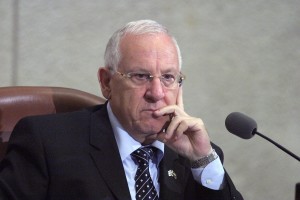Jewish Journal’s Danielle Berrin’s profile of Jeffrey Goldberg is well worth a read for those who want to do a little armchair psychology on Goldberg. It provides no shortage of material for analyzing his views with nuggets like this:
Both of his parents were teachers and union loyalists, inculcating their son with left-leaning liberal politics but not much in the way of a religious education. Instead, Goldberg forged his Jewish identity in response to some schoolyard anti-Semitism whose traumas left him longing for the so-called muscle Judaism represented by Zionism.
Jim has written an excellent blog post on the role of humiliation in forming the neocon psyche which, when read in the context of the description of Goldberg’s “Jewish identity,” offers some insights into how Goldberg may have gained his hawkish instincts.
But the points from Berrin’s article which deserve special attention regard Goldberg’s role in the hyping of an Iraq-al-Qaeda link in a 2002 New Yorker article and accusations that he is “peddling Israeli propaganda.”
Berrin writes of the response to Goldberg’s September Atlantic cover story (I blogged about it here) on the likelihood of an Israeli military strike on Iran’s nuclear program (my emphasis):
The story has been both widely praised and reviled. Critics accused Goldberg of warmongering, framing the piece as a question of who would invade Iran — Israel or the U.S.? — rather than challenging the sense of another Middle East incursion. Charges that he was, yet again, prepping America for war stem back to a 2002 piece he wrote for The New Yorker, in which he claimed to have found evidence linking Saddam Hussein to al-Qaeda. The piece was widely interpreted as an endorsement for the Iraq war, which, on some level, Goldberg regrets. He now admits having been wrong about Hussein’s pursuit of weapons of mass destruction “like everybody else” but maintains the dignity of the story. “I will never regret taking a stand against a genocidal fascist,” he said. “Do I regret the atrocious manner in which the Bush administration prosecuted the war, and its aftermath? Of course.” Citing a report conducted by the Institute for Defense Analyses, he defends his claim connecting Hussein to al-Qaeda.
While I haven’t seen many critics attack Goldberg for “taking a stand against a genocidal fascist,” I have seen a fair number of criticisms of Goldberg’s reporting. His critics assign him considerable responsibility for having given mainstream acceptance to the false narrative that Saddam Hussein had WMDs and was forming ties with al-Qaeda.
Investigative journalist Ken Silverstein wrote in 2006:
In urging war on Iraq, Goldberg took highly dubious assertions — for example, that Saddam was an irrational madman in control of vast quantities of WMDs and that Iraq and Al Qaeda were deeply in bed together — and essentially asserted them as fact. From these unproven allegations, he demonstrated that an invasion of Iraq was the only rational policy.
While Goldberg had plenty of company in being mistaken about the WMD’s and al-Qaeda ties, “everybody else” was not wrong — just the power players in DC As Michael Massing chronicles in his excellent 2004 New York Review of Books article “Now They Tell Us,” dissent was all around. Knight Ridder reporters questioned the premise for the war, but their newspapers were not read in DC. Rereading Massing’s take, Goldberg’s response is a lot like that of disgraced journalist Judith Miller.
Goldberg’s half apology, in which he defers blame to the “atrocious manner in which the Bush administration prosecuted the war,” closely mirrors the avoidance of responsibility displayed by neoconservatives like Richard Perle, David Frum, Kenneth Adelman, Michael Ledeen, Frank Gaffney, Michael Rubin, James Woolsey, Eliot Cohen and Danielle Pletka when they publicly decried the Bush administration’s execution of the war to Vanity Fair‘s David Rose in late 2006. The fact that the war was, in large part, engineered by these very neoconservatives (or colleagues who, quite-literally, worked down the hall) was conveniently overlooked.
Goldberg still stands by his 2002 New Yorker article in which he depended on Mohammed Mansour Shahab, a prisoner in a Kurdish town in northern Iraq, as his source to confirm the Saddam Hussein-al-Qada link. But, as reported by The Guardian‘s Jason Burke, Shahab is a liar and very little of his story which established the al-Qaeda link for Goldberg holds up to closer scrutiny.
In contrast, liberal interventionists (and Goldberg likes to portray himself as one) have offered more thoughtful apologies for their involvement in the lead up to the invasion of Iraq. The editors of the The New Republic issued an apology in which they said “The New Republic deeply regrets its early support for this war” and in may 2004, The editors of The New York Times issued an apology in which the editors took responsibility for, among several failures, depending on “Iraqi informants, defectors and exiles bent on ‘regime change’ in Iraq,” as trusted sources. The information provided by these sources was often misleading and, at times, completely wrong, and the Times admirably took responsibility for not fulfilling basic reportorial duties of double checking their stories.
Goldberg played an important role in convincing the U.S. public that invading Iraq was necessary and well-grounded in factual data about what turned out to be Saddam’s nonexistent ties to Al Qaeda and pursuit of chemical and biological weapons. That Goldberg “maintains the dignity of the story” — a story which served to disseminate falsehoods and brought the U.S. into a preemptive war which resulted in the deaths of over 4,000 Americans and, according to the Iraq Body Count project, 98,585 to 107,594 confirmed civilian casualties — raises questions about Goldberg’s own (to borrow the term) integrity as a journalist. It certainly should make readers of his recent cover story on Iran ask themselves if Goldberg is reporting based on facts or finding facts to conform to his ideologically driven narrative. (Noam Sheizaf, an Israeli blogger, has written about how Goldberg, instead of cherry-picking intelligence, seems to have cherry-picked interview subjects.)
Berrin also touches upon that very question but then lets Goldberg off the hook.
She writes:
But the more insidious critique came when others denounced him for peddling Israeli propaganda, charging him with a deep, subconscious bias. As if somehow his Jewishness makes him unfit to write fairly about Israel.
In fact, Goldberg’s most salient critics don’t attack “his Jewishness” as a bias, but rather his seeming ideological bent in support of aggressive military actions against the enemies of Israel. Connected to this, but not the sole source of the charge, is Goldberg’s service in the Israel Defense Force, where he was a corporal and guarded Palestinian prisoners during the first intifada. A more apt example of criticisms, however, might be Goldberg’s apologia for the Israeli right-wing at every turn, such as his whitewashing of Israeli Prime Minister Benjamin Netanyahu’s genocidal rhetoric against Iran, or how he masks Bibi’s intransigence on an issue — settlements — which Goldberg himself claims to take a liberal stand against.
More importantly, Goldberg’s history of pushing for preemptive wars in the Middle East should give readers pause when he makes the case for an Israeli or U.S. attack on Iran’s nuclear facilities. When viewed in that context, the title of Berrin’s piece could be downright sinister–“Journalist Goldberg changing the world one story at a time.”





RE:”Goldberg forged his Jewish identity in response to some schoolyard anti-Semitism whose traumas left him longing for the so-called muscle Judaism represented by Zionism” – Berrin
MY COMMENT: So the Palestinians must be made to pay for anti-Semitism many decades ago on US schoolyards. If that isn’t sick, I don’t know what is.
An excellent post — polite, diplomatic, but biting.
Sounds more like an unresolved Oedipus complex to me.